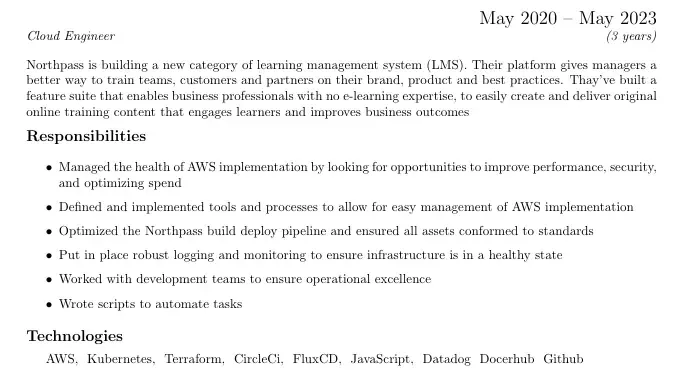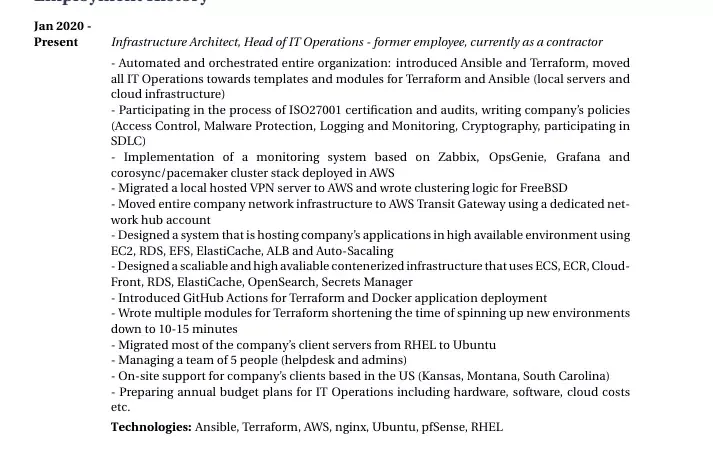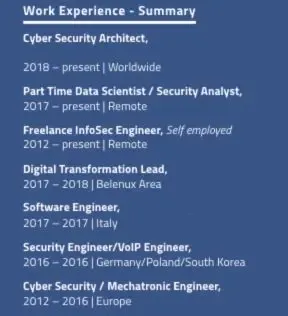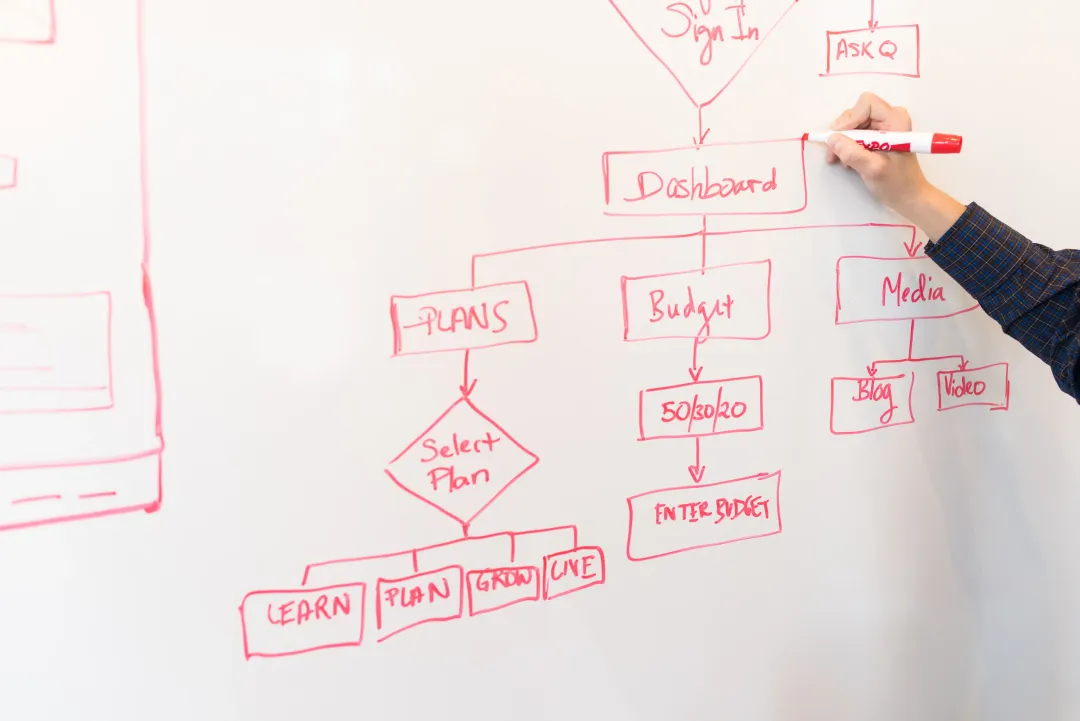
Kajetan Wojtyła
20 November 2023, 6 min read

What's inside
- What to Look for in a Resume
- Real-World CV Examples
- What to Ask During the Interview
- Hiring Python Experts Can Be Challenging
- How Sunscrapers Can Help
- Conclusion
Hiring a Python developer is a crucial step for your project, but it can also be challenging. In this guide, I'll walk you through the essential qualities, skills, and questions to consider when recruiting a Python expert.
What to Look for in a Resume
Developers often include technical details in their resumes, which can be informative and overwhelming.
Here's what to focus on.
Python Versions
Why It Matters: Understanding the Python version is crucial, especially for projects requiring long-term support or library dependencies. Hiring someone who is outdated can cause project delays.
How to Evaluate: Python 2.x is legacy but still used in older projects. Python 3.x is the future and has more community support. Python version 3.10. 4 is the current stable release, the fourth maintenance release of Python 3.10, published on March 24, 2023. Remember to choose the version that aligns with your project needs.
We once hired a developer who only had experience with Python 2. Although they were skilled, the transition to Python 3 created unnecessary delays in our project. Always ensure the candidate has experience with your Python version.
Web Frameworks
Framework Comparison: Django is robust and has many built-in features, ideal for larger projects. Flask and Pyramid offer more flexibility but may require more setup. Make sure the developer's experience aligns with your project scale.
Key Features to Look For: Check if the developer has experience with features critical to your project, like authentication in Django or URL converters in Flask.
Data Science and Machine Learning
Specific Libraries: Scikit Learn is excellent for traditional machine learning algorithms, while TensorFlow is better suited for deep learning. Knowing these libraries' purpose can help you better evaluate a developer's expertise.
Industry Relevance: Libraries like Pandas and NumPy are industry standards for data manipulation. A candidate familiar with these tools is generally more prepared for data-heavy projects.
Soft Skills and Certifications
Measuring Soft Skills: Assess soft skills through behavioral interview questions. For example, ask the candidate to describe a situation where they had to resolve a team conflict.
Certification Value: Python certifications are a bonus but focus more on practical skills and past work experience for a comprehensive evaluation.
We had two potential candidates: one with an impressive technical background and another with fewer technical skills but excellent communication abilities. We chose the latter, and their ability to effectively communicate saved the team countless hours in project misunderstandings.
Are you interested in joining a dynamic team? Check out the career opportunities at Sunscraper’s Career Website.
Real-World CV Examples
A standout CV will include detailed descriptions of projects, the developer's main tasks within those projects, and their key achievements during their tenure with a particular client.
Importantly, the CV should also specify the technologies utilized for each individual project. This approach gives a complete overview of the developer's skill set and indicates which technologies they have used recently and in what context.


There are candidates who list all their skills and technologies in a collective section. While this can offer a broad view of their technical competencies, it does not clarify how and where each skill was applied.
As a result, it's challenging to discern whether their experience with a particular technology is current or perhaps a decade old.
Example of a Bad CV
On the other end of the spectrum, a weak CV often consists of merely a chronological list of workplaces and durations of employment. This bare-bones approach makes it difficult to gauge the candidate's specific expertise or achievements. With such limited information, inviting such a candidate for an interview becomes a shot in the dark, wasting both your time and theirs.

What to Ask During the Interview
Beyond the resume, the interview is your opportunity to assess the developer's skills, mindset, and cultural fit.
Sample Questions: Ask questions like, "Can you explain the rationale behind choosing Flask over Django for your last project?" or "Describe a situation where you took a lead role in resolving a technical issue".
Red Flags: Be cautious of candidates who cannot explain their choices or demonstrate a lack of practical experience, even if they are well-certified.
Technical Questions
Ask questions related to their expertise and let them explain their rationale for choosing certain technologies.
In an interview, we asked a candidate to explain their decision-making process for choosing Flask over Django for a particular project. Their thoughtful answer, which included considerations about project scale, complexity, and team expertise, showed us that they didn't just know how to code but also how to make wise architectural decisions.
Behavioral and Situational Questions
Include questions that gauge their teamwork and communication skills, like "Can you describe a time when you had to solve a problem as a part of a team?".
One candidate gave an insightful answer to a situational question about handling team conflicts. They described a real scenario where they mediated a disagreement between team members over code standards, leading to a more efficient review process for the entire team.
Decision-making Abilities
Inquire if they've had a decision-making role in past projects. This will give you an idea of their experience and willingness to take ownership.
Hiring Python Experts Can Be Challenging
Hiring the right Python experts to build a well-integrated team can be complex and expensive. That's why considering alternative hiring solutions like dedicated teams can be beneficial.
Budget Considerations: Expect costs related to salaries, recruitment agencies, and potential training programs.
Time to Productivity: A new hire might take one to three months to get fully up to speed. Plan your project timelines accordingly.
If you're a business owner struggling to find the right Python developers, learn more about our dedicated development team service. Find Your Perfect Team Today.
We once needed to ramp up a project quickly but couldn't find the right local talent. Instead, we opted for a dedicated development team from another region. Not only did we get the expertise we needed, but we also completed the project under budget.
How Sunscrapers Can Help
At Sunscrapers, we offer a dedicated team model that meets all your project requirements. This approach eliminates the hassles of the hiring process, allowing you to focus on your business goals.
Conclusion
Identifying a professional Python developer involves meticulous attention to their technical skills, problem-solving abilities, and team fit. With these guidelines, you're well-equipped to make an informed hiring decision.
Ready to make a hiring decision? Contact us at Sunscrapers to build your dedicated Python team.


